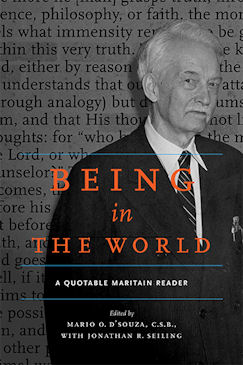
|
Posted November 20, 2014
Book: Being in the World: A quotable Maritain Reader Edited by Mario O. D'Souza, with Jonathan R. Seiling The University of Notre Dame Press. Notre Dame, IN. 2014. Pp. 314 An Excerpt from the Introduction:
I have long admired the lyrical beauty of Maritain's writings; many passages have moved me deeply and have led me to prayer. Many are included among the quotations in this reader. The length of the selected quotations varies greatly: some are a single line, others run into paragraphs. In all of them, however, there is a distinctly sand-alone quality, which is remarkable, given the sophistication and the complexity of Maritain's thought. This reader is not an introduction to Maritain's thought. The quotations stand independently of each other. Some require no special knowledge of philosophy or the history of philosophy, but others fit within a wider philosophical context. An Excerpt from the Book: The aim of political society, as of all human society, implies a certain work to be done in common. Here is one property bound up with the rational and human character of society in its true sense: this work to be done is the objective reason for association and for consent (implicit or explicit) to the common life. Men assemble for a reason, for an object, for a task to be done. In the bourgeois-individualist type of society there is no common work to do, nor is there any form of communion. Each one asks only that the State protect his individual freedom of profit against the possible encroachments of other men's freedoms. Man is a political animal because he is a reasonable animal, because his reason seeks to develop with the help of education, through the teaching and the co-operation of other men, and because society is thus required to accomplish human dignity. Table of Contents: 1. Aristotle 2. Art and the artist 3. Being 4. The Christian life 5. Christian philosophy 6. The Church 7. Culture and civilization 8. Democracy and democratic society 9. Descartes and Cartesian philosophy 10. Philosophy of education 11. Evil 12. Ethics 13. Faith 14. Freedom 15. God 16. History 17. Humanism 18. Intellect and intelligence 19. Knowing and knowledge 20. Man 21. Marx and Marxism 22. Metaphysics and metaphysicians 23. Moral philosophy 24. Mystery and mysticism 25. Natural law and human rights 26. The person 27. The person and individual 28. Personality 29. Philosophers 30. Philosophy 31. Poetry and the poet 32. Politics, society and the state 33. Prayer and contemplation 34. Reason and reasoning 35. Science 36. Theology and the theologian 37. St. Thomas and Thomism 38. Truth 39. Varia 40. Wisdom |
|
